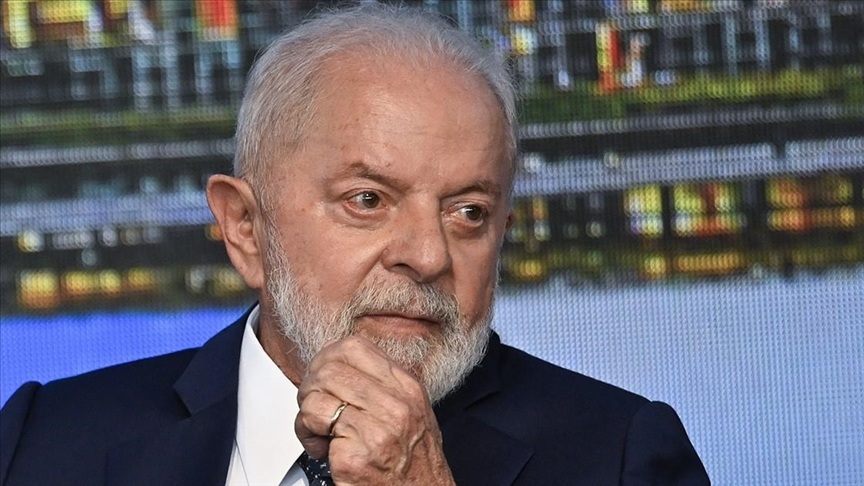Brazilian President Luiz Inácio Lula da Silva has vowed to retaliate against the United States if President Donald Trump follows through on a threat to impose steep import tariffs on Brazilian goods.
Speaking in response to a warning issued by the White House this week, Lula said Brazil would match any unilateral trade measures with reciprocal tariffs on American products.
The diplomatic tension began when Trump announced plans to raise tariffs on Brazilian imports to 50%, effective August 1st, citing the legal proceedings against former Brazilian President Jair Bolsonaro as one of the key justifications.
Bolsonaro is currently facing trial over allegations he attempted to overturn the results of the 2022 election, which he lost to Lula.
In a strongly worded letter addressed to Lula, Trump called the trial a “witch hunt”, labeling Bolsonaro a “highly respected leader throughout the world” and demanding the proceedings be halted immediately.
Trump’s tone mirrored the rhetoric he has used in defending himself against legal cases in the U.S., suggesting a personal affinity with Bolsonaro, his political ally on the global stage.
Lula responded swiftly and firmly.
Posting on social media platform X, the Brazilian president emphasized that Brazil is a sovereign nation with independent institutions and will not accept outside interference.
He warned that any unjustified tariff increases from Washington would be met with equal trade barriers against U.S. exports.
“Brazil will not accept tutelage.
“We are a sovereign country with strong democratic values,” Lula declared.
The United States is Brazil’s second-largest trading partner after China, making any significant tariff hike economically consequential.
A move from the current 10% rate to 50% would have far-reaching effects on bilateral trade.
However, Lula challenged Trump’s rationale, specifically the claim that the U.S. suffers from a trade deficit with Brazil.
Contrary to Trump’s assertion, U.S. government data shows that the United States actually enjoyed a $7.4 billion trade surplus with Brazil in 2024.
Key American exports to Brazil include machinery, aircraft, and mineral fuels, while Brazil exports petroleum, iron, and coffee to the U.S.
Beyond Brazil, Trump also issued similar tariff warnings to 21 other countries, including Japan, South Korea, and Sri Lanka, citing trade imbalances.
But the letter sent to Lula stood out in both content and tone, delving into politically sensitive issues such as Bolsonaro’s trial and Brazil’s social media policies.
Trump accused the Brazilian government of issuing “secret and unlawful censorship orders” to U.S.-based social media platforms.
According to him, these included Truth Social, which is owned by Trump himself through Trump Media.
Several tech companies are currently contesting Brazilian court rulings that have ordered temporary suspensions of social media accounts for spreading hate speech and disinformation.
Lula also pushed back on this front, defending the court-ordered restrictions.
He said Brazilian society stands against hate speech, racism, child exploitation, and attacks on human rights.
According to him, Brazil’s democratic institutions were acting in accordance with national values and laws.
Political Fallout and Strategic Response
Political analysts in Brazil suggest that Trump’s intervention could actually boost Lula’s domestic standing.
Rafael Cortez of the Brazilian firm Tendências Consultoria told BBC News Brasil that when foreign conservative figures like Trump criticize local leaders, it can often galvanize national support.
“We’ve seen this play out in countries like Mexico, Canada, and Australia, where leaders gained popularity after pushing back against Trump,” Cortez noted.
Creomar de Souza, a political risk expert at Dharma Politics, added that Lula’s administration would need to maintain a clear, coordinated response to capitalize politically on the situation.
He said a strong, unified front would be essential if Lula wants to “score a goal” diplomatically.
As tensions rise and the August 1 tariff deadline approaches, global markets and political observers are watching closely.
The standoff highlights not just economic friction, but also the personalized politics increasingly shaping international relations in an era of populist leadership.
For now, Lula appears poised to meet Trump’s pressure head-on, reinforcing Brazil’s independence and signaling that retaliation will come swiftly if trade hostilities escalate.







